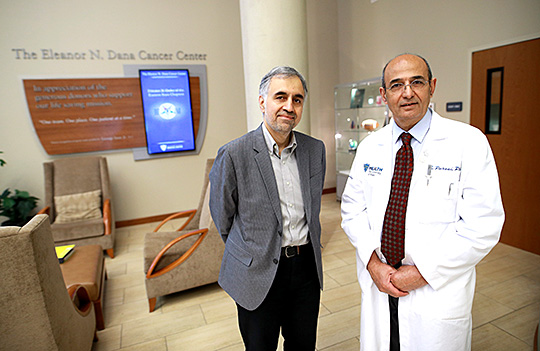Two innovative professors at The University of Toledo from different fields of expertise teamed up to create a clever, common-sense way to solve a problem in treating prostate cancer, the second leading cause of cancer in men.
Recognizing the potential, the Ohio Third Frontier Commission awarded $150,000 to the startup company founded by the mechanical engineer and medical physicist to develop and commercialize the new technology they invented that allows a higher level of radiation to safely be delivered at each session, decreasing significantly the number of treatment sessions needed to eradicate the cancer, while reducing damage to nearby, healthy tissue.

Dr. Mohammad Elahinia, left, and Dr. Ishmael Parsai developed the rectal retractor, which could help treat prostate cancer. The Ohio Third Frontier Commission awarded $150,000 to their startup company to commercialize the new technology.
The new, patent-pending technology, which is being tested on cadavers, is a minimally invasive device that moves the rectum away from the vicinity of the radiation fields targeting the prostate cancer. This allows for the delivery of higher doses of more focused radiation beams, resulting in shorter treatment days while reducing damage to healthy rectal tissue.
“The rectal retractor provides a safer, more efficient way to treat prostate cancer,” Elahinia said. “The medical device is inserted into the body and set in motion by passing a small electrical current in a reliable, clean, silent process known as nitinol actuation, solving the persistent challenge in radiation therapy of prostate tumors.”“Instead of a patient undergoing daily radiation treatment sessions for nearly two months in a conventional method of radiotherapy, he can come in and have five sessions,” Parsai said.
Through his work with patients at the Eleanor N. Dana Cancer Center at The University of Toledo Medical Center, Parsai came up with the idea for the rectal retractor and approached Elahinia to engineer a prototype.
“Normally during radiation therapy for prostate cancer, we work to reduce as much as possible the impact of the radiation dose on any healthy organs, such as the bladder and rectum, but often some damage to healthy, nearby tissue is unavoidable,” Parsai said. “This new device, however, allows us to move the rectum out of the field of radiation so we can eliminate the risk of sacrificing healthy tissue while safely delivering a higher dose for more effective treatment of the tumor. This especially is promising when implementing what is called high-dose rate brachytherapy, as well as newer techniques such as stereotactic body radiotherapy for treatment of prostate cancer.”
While the retractor will mainly serve prostate cancer patients, it also can be applied during radiation therapy for all pelvic tumors, such as cervical, uterine, vaginal and endometrial cancers.
The award to Retractor is part of $2.25 million given by the Ohio Third Frontier Commission to develop new technologies and move them out of the lab and into the marketplace.
“Ohio’s world-class research and medical institutions are developing breakthrough technologies,” said Lydia L. Mihalik, director of the Ohio Development Services Agency and chair of the Ohio Third Frontier Commission. “We are helping get these products to market where they can make a difference.”
The Ohio Third Frontier Technology Validation and Start-Up Fund provides grants to Ohio institutions of higher education and other nonprofit research institutions. The funding is to demonstrate that a technology is commercially viable through activities such as testing and prototyping. The ultimate goal is to commercialize the technologies.
Retractor is a success story for UToledo’s Launchpad Incubation program and Rocket Fuel Fund. LaunchPad Incubation provides entrepreneurial assistance, state-of-the-art facilities and valuable resources to early-stage, technology-based concepts and startup companies. The Rocket Fuel Fund is a program in the UToledo Office of Research funded by the U.S. Economic Development Administration to support early-stage technology development.
“We serve the community, faculty, staff and students,” Brian Genide, director of incubation and venture development at Launchpad, said. “Our team helps with the advancement of early-stage technology concepts, providing funding support for feasibility testing, proof-of-concept validation and prototyping. Our team also has proven to increase the success of grant applications.”
Launchpad Incubation is located in the Nitschke Technology Commercialization Complex. Go to the LaunchPad Incubation website for more information on how the program helps launch new businesses.